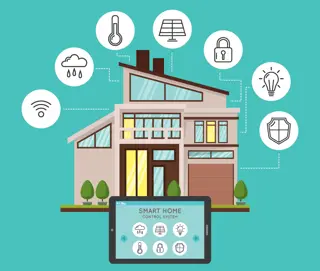Chennai's Smart Home Revolution: How IoT is Transforming Residential Living
 Chennai’s real estate sector is seeing a big change with IoT-enabled smart homes setting new standards for modern living. Urbanization and a tech-savvy population are pushing developers to include automated security systems, energy-efficient solutions, and voice-controlled devices to meet changing consumer needs.
Chennai’s real estate sector is seeing a big change with IoT-enabled smart homes setting new standards for modern living. Urbanization and a tech-savvy population are pushing developers to include automated security systems, energy-efficient solutions, and voice-controlled devices to meet changing consumer needs.
Key Trends in Chennai’s Smart Home Adoption
1. Advanced Security Systems Smart homes in Chennai now have multi-layered security:
- Biometric Access Control: Fingerprint/retina scanners for main doors
- AI-Powered Surveillance: Facial recognition cameras with real-time analytics
- Motion-Activated Alerts: Smartphone notifications for unauthorized entry
2. Energy Management Innovations Residents enjoy:
- Voice control Lighting (e.g., Philips Smart Wired solutions)
- Automated HVAC systems optimizing cooling/heating in coastal climates
- Solar panel integration with smart inverters
These technologies support India’s Smart Cities Mission initiatives promoting renewable energy.
Driving Forces Behind IoT Integration
a. Urban Lifestyle Demands
- Compact apartment living needs space-efficient automation
- Convenience through voice assistants remote management
- Rising awareness of energy conservation in power-scarce areas
b. Government Policy Support
- Schemes like tax incentives for smart home installations
- Funding for IoT infrastructure through Smart Cities Mission projects
- Collaborations with companies like Signify Innovations expanding smart lighting networks
c. Sustainability Focus
- Developers align with global ESG trends through:
- Automated water conservation systems
- Smart meters tracking real-time consumption
- Green certification eligibility for smart buildings
Challenges in Implementation
While smart homes are gaining popularity, some hurdles still exist:
| Factor | Pros | Cons |
|---|---|---|
| Initial Costs | Reduced long-term energy expenses | Higher upfront investment compared to traditional setups |
| Maintenance | Centralized system control | Requires periodic software updates |
| User Education | Enhanced security & comfort | Steeper learning curve for older residents |
Emerging Opportunities
Chennai’s property tech scene holds promise with:
- Property managers creating IoT maintenance platforms
- AI-driven analytics for predictive energy consumption
- Blockchain integration for secure property transactions
Conclusion
Chennai’s housing market reflects national trends of IoT adoption with 16.21% CAGR growth projections. Despite implementation challenges, government support and consumer demand position smart home technology as central to future residential development. Developers balancing innovation with affordability will lead Tamil Nadu’s real estate evolution.